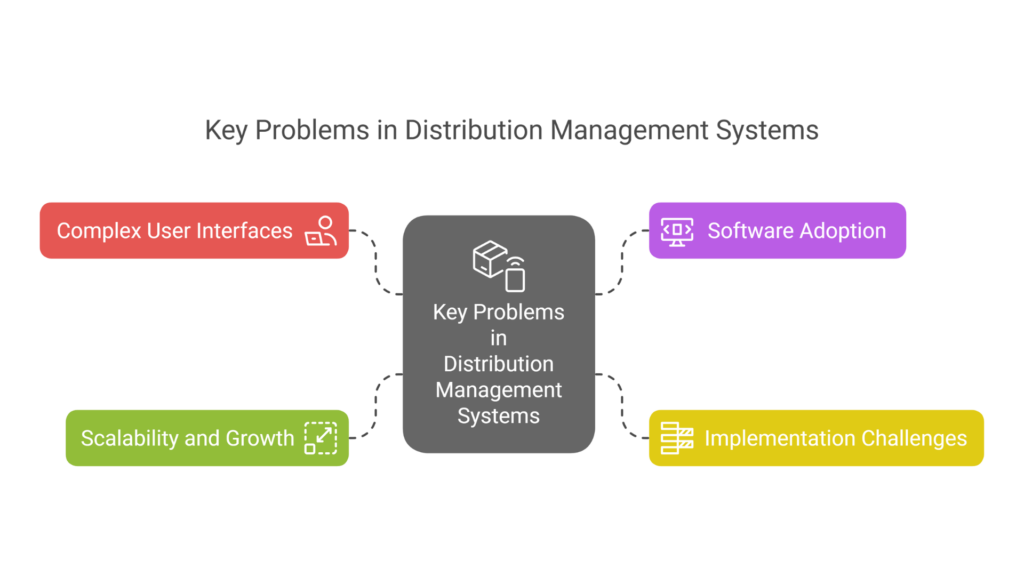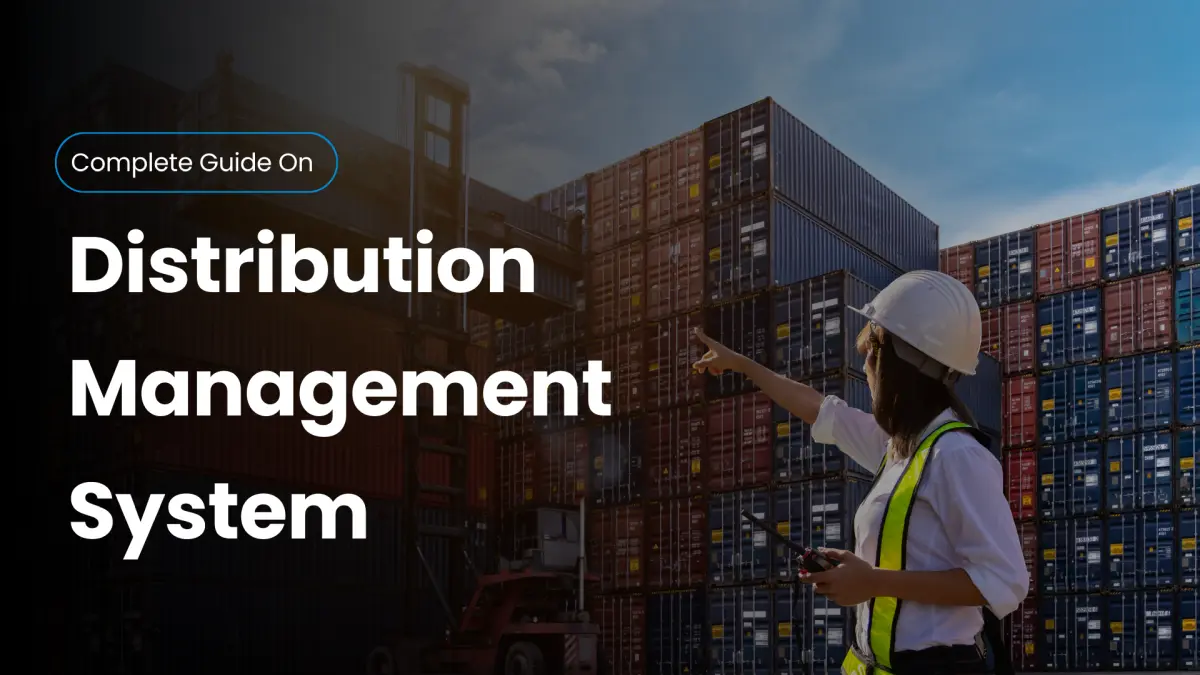A Distribution Management System (DMS) is essential for businesses looking to streamline their supply chain operations. Distribution management system plays a crucial role in ensuring that products reach the right customers at the right time. Whether in FMCG (Fast-Moving Consumer Goods), Consumer Packaged Goods (CPG), pharmaceuticals, or retail, businesses must maintain seamless supply chain operations to stay competitive.
In this article, we’ll explore what a Distribution Management System is, its key features, the benefits it offers to businesses, and the latest trends shaping its future. Whether you’re in FMCG, CPG, or any other industry relying on distribution, understanding DMS can give you a competitive edge.
This guide delves into what a DMS is, its key features, benefits, and the latest trends in transforming distribution management and helping you understand how to force it for long-term success.
Table of Contents
- Understanding Distribution Management System (DMS)
- Why Businesses Need an Automated Distribution Management System?
- Challenges in Traditional Distribution Management
- How DMS Solves Distribution Problems?
- Key Features of a Distribution Management System
- Overcoming Challenges in DMS Implementation
- Trends in Distribution and Supply Chain Management
- How to Choose the Right DMS for Your Business?
- Conclusion:

Understanding Distribution Management System (DMS)
What is a Distribution Management System?
A Distribution Management System (DMS) is a software solution designed to streamline and optimize the movement of goods from manufacturers to distributors, retailers, and end consumers. It automates key processes such as inventory tracking, order management, sales monitoring, and payment collection, ensuring smooth supply chain operations. A well-implemented DMS helps businesses minimize losses, reduce inefficiencies, and enhance overall productivity.
Key Functions and Components of a DMS:
A robust DMS consists of several critical functions that enhance supply chain efficiency:
- Inventory Management: Tracks stock levels, prevents shortages, and optimizes replenishment.
- Order Processing: Automates order fulfillment, reducing delays and errors.
- Sales and Distribution Tracking: Provides real-time visibility into sales performance and demand trends.
- Trade Promotions & Pricing: Helps manage discounts, offers, and incentive schemes efficiently.
- Payment & Claims Processing: Streamlines billing, collections, and distributor claims for better cash flow management.
How DMS Works in the FMCG and CPG Industries:
In FMCG and CPG industries, a DMS plays a crucial role in managing vast distribution networks. It enables:
- Real-time sales visibility for accurate demand forecasting.
- Automated stock replenishment to prevent stockouts and overstocking.
- Seamless trade promotions to enhance retailer engagement and loyalty.
- Faster payment reconciliation for better financial management.
Why Businesses Need an Automated Distribution Management System?
Businesses need a Distribution ERP Management System to streamline their operational workflow. Here are few reasons:
1. Competitive Edge for FMCG and CPG Businesses:
An automated DMS helps FMCG and CPG businesses stay ahead by ensuring efficient inventory control, faster order fulfillment, and improved distributor-retailer collaboration. It eliminates manual errors, reduces operational costs, and enhances scalability.
2. Role of Automation in Supply Chain Optimization:
Automation streamlines order processing, stock replenishment, and sales tracking, ensuring seamless supply chain operations. Businesses can reduce delays, prevent stockouts, and optimize logistics, leading to higher efficiency.
3. Benefits of Real-Time Data and Analytics:
A DMS provides real-time sales insights, demand forecasting, and performance analytics. This enables businesses to make data-driven decisions, enhance distributor productivity, and improve overall profitability.

Challenges in Traditional Distribution Management
Traditional distribution management faces challenges that impact efficiency, profitability, and growth. The best supply chain management software helps overcome these hurdles by automating processes and optimizing operations.
1. Inefficient Inventory Management
- Poor stock tracking leads to frequent stockouts or overstocking, resulting in lost sales or increased holding costs.
- Manual inventory handling increases human errors, making demand forecasting difficult.
2. Poor Visibility into Secondary Sales
- Lack of real-time sales data prevents businesses from making informed decisions.
- Distributors and retailers often operate in silos, causing delays in stock replenishment and inefficient order management.
3. Trade Scheme Fluctuations and Their Impact
- Businesses struggle to maintain and track promotions, leading to poor retailer engagement.
- Unstructured trade promotions cause revenue leakages and low ROI on marketing spend.
4. Slow and Manual Claims Processing
- Manual claim processing leads to delays in distributor payments and reimbursements.
- Inefficient dispute resolution affects cash flow and distributor relationships.
How DMS Solves Distribution Problems?
A Distribution Management System (DMS) addresses key supply chain challenges by enhancing inventory control, sales visibility, trade promotions, and claims processing.
Optimizing Inventory and Fill Rates:
- Prevents stockouts and overstocking with real-time tracking.
- Automates stock replenishment based on demand forecasts.
Enhancing Secondary Sales Visibility:
- Provides data-driven insights to improve sales strategies.
- Enables real-time monitoring of distributor and retailer performance.
Managing Trade Schemes and Retail Engagement:
- Automates promotions and pricing, ensuring consistent execution.
- Maximizes trade scheme ROI by tracking incentive effectiveness.
Streamlining Claims and Payments Processing:
- Speeds up claims resolution, reducing distributor disputes.
- Ensures seamless payment integration for faster transactions.
Key Features of a Distribution Management System

A Distribution Management System (DMS) enhances supply chain efficiency by automating inventory, sales tracking, and retailer engagement. Here are the key features:
1. Inventory and Order Management
- Order Processing Automation: Speeds up order fulfillment, reducing manual errors and delays.
- End-to-End Stock Monitoring: Tracks stock levels in real-time to prevent shortages and overstocking.
2. Sales and Payment Tracking:
- Improved Payment Collection Mechanisms: Streamlines invoicing, reducing payment delays.
- Credit and Discount Management: Helps manage distributor credit limits and promotional discounts effectively.
3. Distributor and Retailer Engagement
- Trade Promotions and Loyalty Programs: Automates promotions, ensuring higher retailer participation.
- Returns and Claims Handling: Simplifies claim settlements, improving distributor relationships.
4. Advanced Reporting and Analytics
- AI-Powered Insights for Decision-Making: Analyzes sales trends and predicts demand for better planning.
- Customizable Reports for Stakeholders: Provides actionable data for distributors, manufacturers, and retailers.
Overcoming Challenges in DMS Implementation
1. Addressing Complex User Interfaces:
A difficult-to-use DMS interface can lead to slow adoption and inefficiency. Solution: Implement intuitive UI/UX, role-based dashboards, and guided training programs to enhance usability and reduce learning curves.
2. Driving Adoption Among Distributors and Retailers:
Many distributors resist new technology due to lack of awareness or training. Solution: Offer mobile-friendly access, incentives for early adoption, and hands-on workshops to ensure smooth transition and engagement.
3. Ensuring Scalability and Future Growth:
A rigid system limits business expansion. Solution: Invest in a cloud-based, modular DMS that supports multi-location operations and future scalability.

Trends in Distribution and Supply Chain Management
As supply chains evolve, businesses are leveraging advanced technologies to enhance efficiency, visibility, and scalability. Below are the key emerging trends shaping distribution management.
1. Rise of Data-Driven Decision Making
- AI and Machine Learning enable predictive analytics for demand forecasting and inventory optimization.
- Businesses can make real-time data-driven decisions to reduce costs and improve distribution efficiency.
2. Adoption of Cloud-Based and SaaS Solutions
- SaaS-based DMS provides businesses with scalability, lower upfront costs, and easy remote access.
- Cloud solutions enable seamless integration across supply chain partners, improving collaboration and visibility.
3. Importance of Scalability and Flexibility
- A modular DMS allows businesses to add functionalities as they grow, ensuring long-term adaptability.
- Scalable solutions help companies expand into new markets without operational disruptions.
4. Digital Transformation in Supply Chain Logistics
- IoT-powered tracking improves real-time monitoring of shipments and warehouse operations.
- Blockchain technology enhances supply chain transparency and fraud prevention.
- Automation and robotics reduce human intervention, speeding up order processing and logistics.
How to Choose the Right DMS for Your Business?
Selecting the right Distribution Management System (DMS) is crucial for optimizing supply chain efficiency and business growth. Here’s how to make the best choice:
Key Factors:
- Scalability: Ensure the DMS can grow with your business.
- Integration Capabilities: It should seamlessly integrate with your existing ERP, CRM, and accounting software.
- User-Friendliness: A simple, intuitive interface enhances adoption among distributors and retailers.
- Real-Time Analytics: Look for advanced reporting tools to improve decision-making.
Evaluating Different DMS Providers
- Compare features, pricing, support services, and customer reviews.
- Opt for cloud-based ERP solutions for flexibility and remote access.
Implementation Best Practices
- Provide proper training to ensure smooth adoption.
- Start with pilot testing before full-scale implementation.
- Continuously monitor performance and gather feedback for improvements.
Choosing the best distribution management system provider company ensures enhanced efficiency, better inventory control, and streamlined distribution operations.
Conclusion:
The future of distribution management lies in automation, AI, and real-time analytics. As supply chains evolve, businesses must adopt scalable, cloud-based DMS solutions for seamless inventory control, faster order fulfillment, and enhanced visibility.
A smart DMS powered by AI, IoT, and blockchain enables better decision-making, cost reduction, and operational efficiency. To stay ahead, companies should embrace advanced distribution technologies that drive productivity and profitability.
At Infintrix Technologies, we provide cutting-edge DMS solutions designed to optimize your supply chain, enhance distributor engagement, and fuel business growth.

